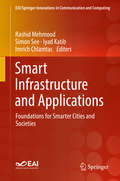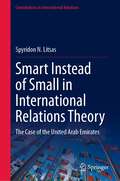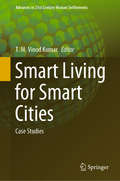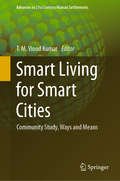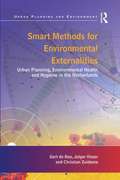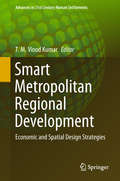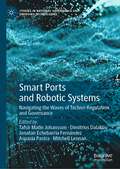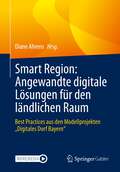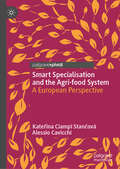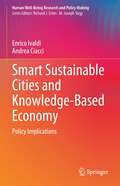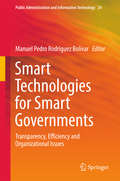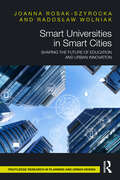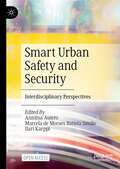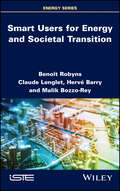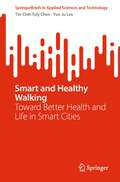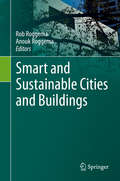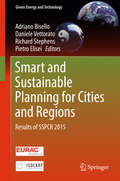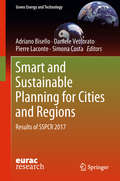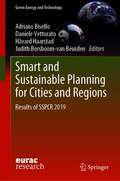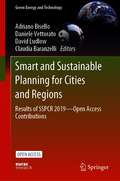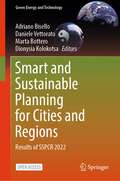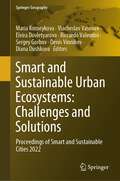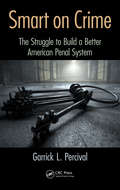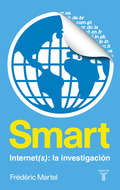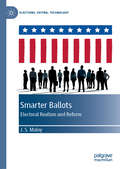- Table View
- List View
Smart Infrastructure and Applications: Foundations for Smarter Cities and Societies (EAI/Springer Innovations in Communication and Computing #224)
by Simon See Rashid Mehmood Iyad Katib Imrich ChlamtacThis book provides a multidisciplinary view of smart infrastructure through a range of diverse introductory and advanced topics. The book features an array of subjects that include: smart cities and infrastructure, e-healthcare, emergency and disaster management, Internet of Vehicles, supply chain management, eGovernance, and high performance computing. The book is divided into five parts: Smart Transportation, Smart Healthcare, Miscellaneous Applications, Big Data and High Performance Computing, and Internet of Things (IoT). Contributions are from academics, researchers, and industry professionals around the world. Features a broad mix of topics related to smart infrastructure and smart applications, particularly high performance computing, big data, and artificial intelligence; Includes a strong emphasis on methodological aspects of infrastructure, technology and application development; Presents a substantial overview of research and development on key economic sectors including healthcare and transportation.
Smart Instead of Small in International Relations Theory: The Case of the United Arab Emirates (Contributions to International Relations)
by Spyridon N. LitsasSmall States theory supports the argument that small international actors have a vital role in the international system. After 9/11, it emerged as a more focused attempt to show that 'small' can be 'attractive and functional' in an era of normative political and religious radicalism. This book argues that Small States Theory is not relevant to the perplexities of the post-multipolar international system and produces a new theory, the Smart States Theory. Based on structural and neoclassical realism, it attempts to identify the origins of 'state-smartness' in foreign policy, leadership, and domestic politics. The United Arab Emirates will be used as the case study of this novel theoretical approach. The impressive evolution of the Trucial States to a modern nation-state of high technology, dynamic foreign policy as the recent pandemic fully showed, unique leadership, and unparalleled tolerance towards other religions and cultures, make the UAE a brilliant example of a smart state of the 21st century. The reader of the book will be introduced to a new theory in International Relations as well as to the history, politics, society, and leadership of a state that plays a pivotal role not only in the Gulf region but in the broader framework of the Middle East too; the United Arab Emirates.
Smart Living for Smart Cities: Case Studies (Advances in 21st Century Human Settlements)
by T. M. Vinod KumarThis book, based on extensive international collaborative research, highlights the state-of-the-art design of “smart living” for metropolises, megacities, and metacities, as well as at the community and neighbourhood level. Smart living is one of six main components of smart cities, the others being smart people, smart economy, smart environment, smart mobility and smart governance. Smart living in any smart city can only be designed and implemented with active roles for smart people and smart city government, and as a joint effort combining e-Democracy, e-Governance and ICT-IoT systems. In addition to using information and communication technologies, the Internet of Things, Internet of Governance (e-Governance) and Internet of People (e-Democracy), the design of smart living utilizes various domain-specific tools to achieve coordinated, effective and efficient management, development, and conservation, and to improve ecological, social, biophysical, psychological and economic well-being in an equitable manner without compromising the sustainability of development ecosystems and stakeholders. This book presents case studies covering more than 10 cities and centred on domain-specific smart living components. The book is issued in two volumes. and this volume focus on city studies.
Smart Living for Smart Cities: Community Study, Ways and Means (Advances in 21st Century Human Settlements)
by T. M. Vinod KumarThis book, based on extensive international collaborative research, highlights the state-of-the-art design of smart living for metropolises, megacities, and metacities, as well as at the community and neighbourhood level. Smart living is one of six main components of smart cities, the others being smart people, smart economy, smart environment, smart mobility and smart governance. Smart living in any smart city can only be designed and implemented with active roles for smart people and smart city government, and as a joint effort combining e-Democracy, e-Governance and ICT-IoT systems. In addition to using information and communication technologies, the Internet of Things, Internet of Governance (e-Governance) and Internet of People (e-Democracy), the design of smart living utilizes various domain-specific tools to achieve coordinated, effective and efficient management, development, and conservation, and to improve ecological, social, biophysical, psychological and economic well-being in an equitable manner without compromising the sustainability of development ecosystems and stakeholders. This book presents case studies covering more than 10 cities and centred on domain-specific smart living components. The book is issued in two volumes and this volume focus on community studies and ways and means.
Smart Methods for Environmental Externalities: Urban Planning, Environmental Health and Hygiene in the Netherlands
by Gert de Roo Jelger VisserIn recent years, Dutch environmental policy has undergone some pivotal changes, the most significant of which have been decentralization and deregulation, encouraging local communities to develop and deliver policies which are tailor-made to their particular situation. These changes have led to the development of some innovative practical instruments for aiding sustainable environmental spatial policy. This book discusses these new 'methods for environmental externalities' and their significance in the development and delivery of Dutch environmental policies, particularly how they ensure that issues such as health and hygiene are introduced in the early stages of spatial planning processes. This book highlights the most prominent and relevant of these innovative 'methods for environmental externalities' as well as comparing them with some of the classic methods, and analysing strengths and weaknesses. It argues that having such a broad and varied choice of methods is the key to ensuring the impressive and groundbreaking Dutch creativity in environmental management. In conclusion, the book extrapolates current trends in environmental policy, expresses likely and possible developments in 'methods for environmental externalities' and shows how such methods can contribute in our ongoing attempts to develop and deliver liveable, pleasant and sustainable towns and cities.
Smart Metropolitan Regional Development: Economic And Spatial Design Strategies (Advances in 21st Century Human Settlements)
by T.M. Vinod KumarThis book discusses the concept and practice of a smart metropolitan region, and how smart cities promote healthy economic and spatial development. It highlights how smart metropolitan regional development can energize, reorganize and transform the legacy economy into a smart economy; how it can help embrace Information and Communications Technology (ICT); and how it can foster a shared economy. In addition, it outlines how the five pillars of the third industrial revolution can be achieved by smart communities. In addition, the book draws on 16 in-depth city case studies from ten countries to explore the state of the art regarding the smart economy in smart cities – and to apply the lessons learned to shape smart metropolitan economic and spatial development.
Smart Ports and Robotic Systems: Navigating the Waves of Techno-Regulation and Governance (Studies in National Governance and Emerging Technologies)
by Dimitrios Dalaklis Jonatan Echebarria Fernández Tafsir Matin Johansson Mitchell Lennan Aspasia PastraThis book provides a comprehensive overview of smart ports and remote technologies in the maritime industry. It demonstrates how modern advances in artificial intelligence and robotics have transformed the shipping industry, and assesses the impact of this technology from a law and governance standpoint. The book covers a range of topics including port autonomous operations systems, cybersecurity, big data analytics, digitalization and blockchain to throw light on the opportunities and benefits of these new technologies in improving security and safety. It also considers the challenges and threats of their application. It concludes by examining the trajectory of national and international regulatory developments. The book will appeal to scholars and students of maritime technology, law and governance, as well as practitioners and policymakers.Chapters 8, 19 and 20 are available open access under a Creative Commons Attribution 4.0 International License via link.springer.com.
Smart Region: Best Practices aus den Modellprojekten „Digitales Dorf Bayern“
by Diane AhrensKann digitale Transformation im ländlichen Raum als Chance zur Verbesserung gleichwertiger Lebensverhältnisse genutzt werden? Anhand von drei bayerischen Modellregionen wurden in zahlreichen Handlungsfeldern – z.B. Gesundheit und Pflege, Mobilität, Kirche, Arbeiten, Schule und Bildung - digitale Lösungen gemeinsam mit Betroffenen entwickelt, eingeführt und getestet. Aufgrund des ganzheitlichen Projektfokus sind „Living Labs“ entstanden, die Synergien, Potentiale, aber auch Herausforderungen deutlich machen und zeigen, dass ländliche Räume eigene Anforderungen haben, die sich maßgeblich von „Smart Cities“ unterscheiden.
Smart Specialisation and the Agri-food System: A European Perspective
by Alessio Cavicchi Kateřina Ciampi StančováThe book discusses recent innovation and diversification paths in agri-food, specifically the linkages among food research and innovation, production, consumption, gastronomy, and place branding as well as technology. It also focuses on EU policies and instruments in support of R&I activities in agri-food, and explores agri-food domains within the context of smart specialisation.
Smart Sustainable Cities and Knowledge-Based Economy: Policy Implications (Human Well-Being Research and Policy Making)
by Enrico Ivaldi Andrea CiacciThis book provides information and resources to city planners and other public policy officials on the importance of smart sustainable cities and their relationship with urban knowledge-based economy. It answers important topical questions relating to urban sustainable development and human well-being, namely, how can we implement policies and programs that can make cities “smart” and boost their knowledge-based development? How can such programs reduce inequalities and enhance the environment where people live and work? The authors suggest a new approach to the creation of sustainable smart cities, not only in metropolises but also in smaller urban spaces. They advance the body of knowledge in entrepreneurship literature by examining both the European regional understanding of entrepreneurship and the quality of life and well-being at city levels. They also provide synthetic indexes to assess the relationship between perceived quality of life and entrepreneurship. This book stimulates the debate on the role of smart cities in promoting entrepreneurship, which is a currently under-investigated topic in Europe, and is of interest to a wide range of practitioners, professionals and academics in the area of well-being and quality of life research, urban studies, public policy, and sustainable development.
Smart Technologies for Smart Governments
by Manuel Pedro Rodríguez BolívarThis book examines the introduction of smart technologies into public administrations and the organizational issues caused by these implementations, and the potential of information and communication technologies (ICTs) to rationalize and improve government, transform governance and organizational issues, and address economic, social, and environmental challenges. Cities are increasingly using new technologies in the delivery of public sector services and in the improvement of government transparency, business-led urban development, and urban sustainability. The book will examine specific smart projects that cities are embracing to improve transparency, efficiency, sustainability, mobility, and whether all cities are prepared to implement smart technologies and the incentives for promoting implementation. This focus on the smart technologies applied to public sector entities will be of interest to academics, researchers, policy-makers, public managers, international organizations and technical experts involved in and responsible for the governance, development and design of Smart Cities.
Smart Universities in Smart Cities: Shaping the Future of Education and Urban Innovation (Routledge Research in Planning and Urban Design)
by Radosław Wolniak Joanna Rosak-SzyrockaSmart Universities in Smart Cities: Shaping the Future of Education and Urban Innovation focuses on how higher education institutions are adapting to the challenges of the digital age in a world increasingly influenced by technology and sustainability. Universities are becoming an indispensable element of smart cities, driving forward innovation, sustainability, and urban living.The book explores how emerging technologies such as AI, IoT, and blockchain are transforming campuses into dynamic, data-driven ecosystems. Both of these dimensions are studied through data analytics, case studies, and futuristic thinking perspectives to identify opportunities and challenges of the establishment of smart universities within the broader ecosystem of smarter cities. The book offers a holistic approach to planning educational institutions, covering issues such as sustainable campus development, digital learning environments, and smart mobility solutions.As universities undergo digital transformation, they advance not only learning but also the larger role of academia in society. The book envisions the future, where intelligent campuses act as centres of knowledge, collaboration, and sustainable development, propelling the world into a smarter and more inclusive reality for future generations. It will be of interest to researchers and students of urban planning and sustainability studies, as well as to urban planners and policymakers.
Smart Urban Safety and Security: Interdisciplinary Perspectives
by Anniina Autero Marcela de Moraes Batista Simão Ilari KarppiThis open access book explores the use of technologies for urban safety and security. Rather than focusing on the technologies themselves, it provides and in-depth analysis of the complex urban transformations linked to the increasing integration of technical systems in the built environment. Interdisciplinary contributions explain how technologies can improve urban safety, whilst offering a broader discussion relative to urban, socio-economic and political factors. Against simplistic techno-solutionist ideas, the authors illustrate the role of technology as means to an end and show how technologies can widen our understanding of safety and security. Readers are introduced to issues relative to the practical implementation, development, and testing of urban technologies via numerous case studies from cities around the world.
Smart Users for Energy and Societal Transition
by Hervé Barry Benoit Robyns Claude Lenglet Malik Bozzo-ReyClimate change and the loss of biodiversity are now realities. Their causes and origins stem from the energy, goods and resources relied upon by the lifestyle of a growing part of humanity. Smart Users for Energy and Societal Transition presents this much needed transition, as well as the scenarios and paths essential to mitigating the impacts of climate change. It deals with transitions experimented in the form of ecosystems in universities, cities and territories, as well as with concepts of smart buildings, smart grids and smart cities, addressed to smart users – or not – in an interdisciplinary research context. Sociological issues related to the role of smart building users are discussed, ranging from acceptance to the appropriation of the technologies made available to them. The book highlights the ethics of this essential transition and the importance of individual behaviors in safeguarding humanity on a preserved planet.
Smart and Healthy Walking: Toward Better Health and Life in Smart Cities (SpringerBriefs in Applied Sciences and Technology)
by Tin-Chih Toly Chen Yun-Ju LeeThis book examines smart technologies and their invaluable role in augmenting the walking experience of mobile users. From meticulously planned walking routes to precise footprint detection and analysis, as well as cutting-edge fall detection and prevention mechanisms, these intelligent technologies have the potential to revolutionize healthy and smart walking. Against the backdrop of the post-COVID-19 era, where unrestricted mobility has become pivotal for restoring normalcy, the demand for smart healthcare solutions has soared. The book explores latest advances in sensor technology, cloud computing, deep learning, and networking and related innovative applications that can leverage smart technologies to enhance healthy walking.
Smart and Sustainable Cities and Buildings (Contemporary Urban Design Thinking Ser.)
by Rob Roggema Anouk RoggemaThis book brings together the papers presented at the Smart and Sustainable Built Environments Conference, 2018 (SASBE).This latest research falls into two tracks: smart and sustainable design and planning cities; and the technicalities of smart and sustainable buildings. The growth of smart cities is evident, but not always linked to sustainability. This book gives an overview of the latest academic developments in increasing the smartness and sustainability of our cities and buildings. Aspects such as inclusivity, smart cities, place and space, the resilient city, urbanity and urban ecology are prominently featured in the design and planning part of the book; while energy, educational buildings, comfort, building design, construction and performance form the sub-themes of the technical part of the book. This book will appeal to urban designers, architects, urban planners, smart city designers and sustainable building experts.
Smart and Sustainable Planning for Cities and Regions
by Richard Stephens Adriano Bisello Daniele Vettorato Pietro EliseiThis book presents cutting-edge work on innovative planning methodologies, tools and experiences aimed at supporting the transition of our cities and regions towards a more smart and sustainable dimension. This book comprises a selection of the best papers presented at the international conference "Smart and Sustainable Planning for Cities and Regions 2015", held in November 2015 in Bolzano, Italy. Contributions from different research fields within urban and regional planning from the scientific as well as the professional community are presented: energy planning for cities and regions, how to couple the energy-climate goals with the development or renovation of the built environment and how to tackle the vulnerability to climate change; smart and sustainable technologies, big data, integrated infrastructures and mobility management, from holistic geospatial tools to innovative apps and Internet of Things; benefits, costs and opportunities of urban transition toward a more smart and sustainable dimension, accounting and assessment of values and trade-offs within the decision making processes; governance for smart and sustainable growth, fostering place-based policy-making, active and effective stakeholders' participation, co-production and public-private partnerships; cooperation and demonstration projects: their role in fostering the adoption of new approaches and technologies, towards the development of win-win solutions.
Smart and Sustainable Planning for Cities and Regions: Results Of Sspcr 2015 (Green Energy And Technology)
by Adriano Bisello Daniele Vettorato Pierre Laconte Simona CostaThis book comprises a selection of the top contributions presented at the second international conference “Smart and Sustainable Planning for Cities and Regions 2017”, held in March 2017 in Bolzano, Italy. Featuring forty-six papers by policy-makers, academics and consultants, it discusses current groundbreaking research in smart and sustainable planning, including the progress made in overcoming cities’ challenges towards improving the quality of life. Climate change adaptation and mitigation of global warming, generally identified as drivers of global policies, are just the “tip of the iceberg” when it comes to smart energy transition. Indeed, equally relevant towards this current transformation – and key topics in this volume – are ICTs, public spaces and society; next economy for the city; strategies and actions for good governance; urban-rural innovation; rethinking mobility. The book’s depth in understanding and insightfulness in re-thinking demonstrate the breaking of new ground in smart and sustainable planning. A new ground that policy-makers, academics and consultants may build upon as a bedrock for smart and sustainable planning.
Smart and Sustainable Planning for Cities and Regions: Results of SSPCR 2019 (Green Energy and Technology)
by Judith Borsboom-van Beurden Håvard Haarstad Adriano Bisello Daniele VettoratoThis book offers a selection of research papers and case studies presented at the 3rd international conference “Smart and Sustainable Planning for Cities and Regions”, held in December 2019 in Bolzano, Italy, and explores the concept of smart and sustainable planning, including top contributions from academics, policy makers, consultants and other professionals. Innovation processes such as co-design and co-creation help establish collaborations that engage with stakeholders in a trustworthy and transparent environment while answering the need for new value propositions. The importance of an integrated, holistic approach is widely recognized to break down silos in local government, in particular, when aimed at achieving a better integration of climate-energy planning. Despite the ongoing urbanization and polarization processes, new synergies between urban and rural areas emerge, linking development opportunities to intrinsic cultural, natural and man-made landscape values. The increasing availability of big, real-time urban data and advanced ICT facilitates frequent assessment and continuous monitoring of performances, while allowing fine-tuning as needed. This is valid not only for individual projects but also on a wider scale. In addition, and circling back to the first point, (big) urban data and ICT can be of enormous help in facilitating engagement and co-creation by raising awareness and by providing insight into the local consequences of specific plans. However, this potential is not yet fully exploited in standard processes and procedures, which can therefore lack the agility and flexibility to keep up with the pulse of the city and dynamics of society. The book provides a multi-disciplinary outlook based on experience to orient the reader in the giant galaxy of smart and sustainable planning, support the transposition of research into practice, scale up visionary approaches and design groundbreaking planning policies and tools.
Smart and Sustainable Planning for Cities and Regions: Results of SSPCR 2019—Open Access Contributions (Green Energy and Technology)
by Adriano Bisello Daniele Vettorato David Ludlow Claudia BaranzelliThis open access book offers a selection of research papers and case studies presented at the 3rd international conference “Smart and Sustainable Planning for Cities and Regions”, held in December 2019 in Bolzano, Italy, and explores the concept of smart and sustainable planning, including top contributions from academics, policy makers, consultants and other professionals. Innovation processes such as co-design and co-creation help establish collaborations that engage with stakeholders in a trustworthy and transparent environment while answering the need for new value propositions. The importance of an integrated, holistic approach is widely recognized to break down silos in local government, in particular, when aimed at achieving a better integration of climate-energy planning. Despite the ongoing urbanization and polarization processes, new synergies between urban and rural areas emerge, linking development opportunities to intrinsic cultural, natural and man-made landscape values. The increasing availability of big, real-time urban data and advanced ICT facilitates frequent assessment and continuous monitoring of performances, while allowing fine-tuning as needed. This is valid not only for individual projects but also on a wider scale. In addition, and circling back to the first point, (big) urban data and ICT can be of enormous help in facilitating engagement and co-creation by raising awareness and by providing insight into the local consequences of specific plans. However, this potential is not yet fully exploited in standard processes and procedures, which can therefore lack the agility and flexibility to keep up with the pulse of the city and dynamics of society. The book provides a multi-disciplinary outlook based on experience to orient the reader in the giant galaxy of smart and sustainable planning, support the transposition of research into practice, scale up visionary approaches and design groundbreaking planning policies and tools.
Smart and Sustainable Planning for Cities and Regions: Results of SSPCR 2022 (Green Energy and Technology)
by Dionysia Kolokotsa Adriano Bisello Daniele Vettorato Marta BotteroThis open access book includes a selection of innovative contributions presented at the 4th international conference “Smart and Sustainable Planning for Cities and Regions 2022”, held in Bolzano, Italy in July 2022. Featuring 10 papers by academics and consultants, strongly rooted in practical experiences and international projects, it discusses current ground-breaking research in innovative and sustainable planning for cities, with a focus on the environmental, economic, and social challenges associated with the global sustainability transition and energy systems integration. The contributions are illustrative of the richness of the issues discussed and the breadth of the emerging themes, including innovative business models for building and infrastructure at district level, integrated sustainability assessment schemes for Positive Energy Districts, a material flow accounting model for regional metabolism, energy communities as a lever to promote historical and landscape values, optimized and electrified last-mile logistics, multi-criteria decision analysis tools to redefine center/periphery relationships, a framework for socio-spatial analysis related to social practices, design principles and communication technologies improving both indoor and outdoor public spaces, augmented nature-based solution coupling the green elements with the latest technologies to deliver healthier and more appealing cities.
Smart and Sustainable Urban Ecosystems: Proceedings of Smart and Sustainable Cities 2022 (Springer Geography)
by Riccardo Valentini Elvira Dovletyarova Viacheslav Vasenev Maria Korneykova Sergey Gorbov Denis Vinnikov Diana DushkovaThis book provides multidisciplinary approaches to smart and sustainable urban ecosystems. Urbanization is a global tendency, and up to 70% of the world population is projected to live in cities by 2050. How will this rapid urbanization alter the face of the world? What are the environmental consequences of megacities’ expansion? What are smart solutions to make life in cities safe, comfortable, and environmentally friendly? These and other important questions are addressed by the conference Smart and Sustainable Cities (SSC). This year’s theme for the conference will be « Sustainable urban ecosystems: challenges and solutions». Megapolises are complex ecosystems. Air and water quality, vegetation, and soils in megapolises are exposed to anthropogenic influence. Studying negative environmental consequences of the anthropogenic and technogenic pressures is among the key tasks of urban ecology and environmental impact assessment. Advanced approaches and smart technologies to monitor, model, and assess environmental consequences and risks in megapolises will be widely discussed at the conference. Searching for solutions of the environmental problems of modern megapolises will be the key point of the conference. Successful experiences of sustainable urban development and nature-based solutions to support climate adaptation, carbon neutrality, and human health will be presented in the conference proceedings.
Smart on Crime: The Struggle to Build a Better American Penal System
by Garrick L. PercivalThe most punitive era in American history reached its apex in the 1990s, but the trend has reversed in recent years. Smart on Crime: The Struggle to Build a Better American Penal System examines the factors causing this dramatic turnaround. It relates and echoes the increasing need and desire on the part of actors in the American government system to construct a penal system that is more rational and humane.Author Garrick L. Percival points out that the prison boom did not naturally emerge as a governmental response to increasing crime rates. Instead, political forces actively built and shaped the growth of a more aggressive and populated penal system. He is optimistic that the shifting political forces surrounding crime and punishment can now reform the system, explaining how current political actors can craft more constructive and just policies and programs. The book shows how rationality and humanitarianism lead to a penal system that imprisons fewer people, does less harm to the lives of individual offenders and those close to them, and is less expensive to maintain.The book presents empirical data to concretely demonstrate what is working and what is not in today’s penal system. It closely examines policies and practices in Texas, Ohio, and California as comparative illustrations on what progress has been made or needs to be made in penal systems across the United States. The book includes a comprehensive discussion of highlighted issues, and relates more than two dozen interviews with pivotal political actors who clarify why there is a major shift underway in the American penal system. Their insights reveal paths that can be taken to improve the current penal system.
Smart. Internet(s): una investigación
by Frédéric Martel<P>Un análisis sorprendente del uso de internet y las redes sociales en el mundo, por el aclamado autor de Cultura Mainstream ¿Cómo ha podido China crear sus propios clones de Google, Facebook y YouTube? ¿De qué manera los países árabes supieron emplear las redes sociales para emprender sus revoluciones? ¿Debemos temer que el inglés se convierta en la lengua empleada «por defecto» en Internet? <P>De Silicon Valley a Tokio, de Brasil a Washington, de Sudáfrica a la India y llegando hasta Cuba o Gaza, Frédéric Martel emprende una investigación sin precedentes, sobre el terreno, y hace un análisis profundo del protagonismo y la influencia de internet y las redes sociales en el mundo, demostrando que hay tantos internets como países. <P>Este enfoque del tema, novedoso y optimista, da cuenta de un mundo mucho más smart de lo que pensábamos, en el que se respetan las singularidades nacionales, las identidades y las diferenciaslocales. No debemos temer el mundo digitalizado: el futuro de internet depende del uso que se haga de él.
Smarter Ballots: Electoral Realism and Reform (Elections, Voting, Technology)
by J.S. MaloyThis book presents a new democratic theory of election reform, using the tradition of political realism to interrogate and synthesize findings from global elections research and voting theory. In a world of democratic deficits and uncivil societies, political researchers and reformers should prioritize creating smarter ballots before smarter voters. Many democracies’ electoral systems impose a dilemma of disempowerment which traps voters between the twin dangers of vote-splitting and “lesser evil” choices, restricting individual expression while degrading systemic accountability. The application of innovative conceptual tools to comparative empirical analysis and previous experimental results reveals that ballot structure is crucial, but often overlooked, in sustaining this dilemma. Multi-mark ballot structures can resolve the dilemma of disempowerment by allowing voters to rank or grade multiple parties or candidates per contest, thereby furnishing democratic citizens with a broader array of options, finer tools of expression, and stronger powers of accountability. Innovative proposals for ranking and grading ballots in both multi-winner and single-winner contests, including referendums, are offered to provoke further experimentation and reform—a process that may help the cause of democratic elections’ relevance and survival.
